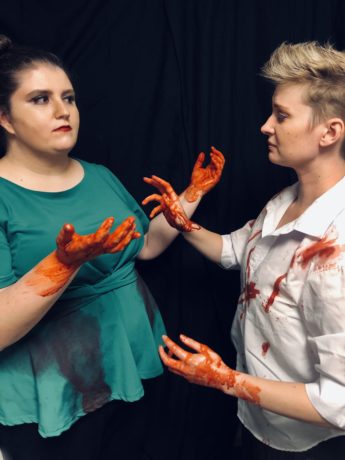By Katie Crabb
Something wicked this way comes in Britches and Hose Theatre Company’s gender-blind version of Macbeth, which breathes new life into one of Shakespeare’s most famous plays. The classic scenes are familiar, but played with a new edge in this atmospheric production directed by Dan Clark. The show opens with the famed weird sisters, who are delightfully creepy, setting the mood for a story that is so much about the dark lure of ambition and trying to wrestle with fate. Played by Anastasia Brunk, Sarah Schettini, and Stephanie Oden, the three witches also double as murderers, lending dark humor to every scene they’re in. When they take a selfie after they murder Macduff’s family, you don’t want to laugh—but part of you does.

Sarah Pfanz in the title role and Leandra Lynn as Lady Macbeth have a dynamic that immediately tugs you in as soon as they share their first scene. They’re up to something from almost that first moment, but the push and pull between them remains fascinating throughout the show. Macbeth, reluctant from the start to commit the first murder, seems to start cracking under pressure about the idea before he even commits the crime, but still listens to Lady Macbeth’s whisper in his ear, their fingers intertwined and slick with blood. The banquet scene where Macbeth sees Banquo’s ghost (played warmly in life and with spine-tingling horror in death by Spencer Pilcher) stands out especially, as Macbeth starts openly falling apart under the weight of his guilt, while Lady Macbeth reassures the guests and laughs off his raving as an eccentric affliction. The connection between them exists even when they’re not on stage together. When Macbeth uses hand sanitizer while busy planning another murder, you instantly think of Lady Macbeth’s “out damned spot” scene later down the line, which Lynn plays with a quiet desperation. She’s breaking down too, just not out in the open.
Rather than watching a man go on a gleeful murder spree with no remorse—think Richard III—Macbeth is in crisis, breaking down further and further as things get bloodier. It would be easy to play Macbeth as a one-note villain laughing darkly over a murderous ascent to the Scottish throne, but Pfanz plays the infamous character with an intriguing nuance—a facial expression here, a crack in her voice there, a too-tight grasp of someone’s shoulder. The devil is in the details. You’re horrified by and feel pity for Macbeth, all at once, which is especially true during the soliloquy after Lady Macbeth’s suicide. The words are familiar and famous, yet more vulnerable than expected for a character whose hands were covered in blood not too long before. Macbeth, manic before learning of his wife’s death, descends even further into mania and returns once more to what he knows, and what led him down this murderous road in the first place: the violence of war.
The relationship between violence and manhood comes up again and again, with Lady Macbeth’s famous “unsex me here” line and her constant questioning of Macbeth, asking “are you a man?” This also comes up in the heart-wrenching scene where Macduff (played with wonderful enthusiasm by Jeffrey Elmore) finds out his entire family has been murdered. Prince Malcolm (Dave Joria) says “dispute it like a man” encouraging Macduff toward the inevitable violence needed to oust Macbeth, and yet Macduff says in response with great feeling, “first I must also feel it as a man.” Given the gender-blind nature of the show where the lead role is played by a woman, this theme is made all the more interesting.
Macbeth might not lay his hands on every victim after Duncan’s initial murder, but he continues the string of deaths, for ambition, yes, but also out of fear, an unchecked, guilty fear that permeates every scene Pfanz is in with great power. As Lady Macbeth lays ill from her mental terror, Macbeth asks the doctor if he can heal her. “Canst thou not minister to a mind diseased?” Macbeth wants to know, left alone to carry the burden of his guilt, speaking of himself as much as his wife and wishing he could undo everything that’s happened. Most of us aren’t murderers, but that feeling of wanting to undo something you’ve done is still universal, and it plays to great effect here.
Macbeth is met with the grief-stricken Macduff’s knife in an intense, electric confrontation, falling prey to the same bloody fate as his victims for his crimes. Macduff presents the soon-to-be King Malcolm with Macbeth’s head, the story drenched in blood from start to finish, and the earlier image of Macbeth and his wife’s red, intertwined fingers haunting you as you go.
Running Time: Approximately 2 hours, with one 15-minute intermission.
Macbeth, presented by Britches and Hose Theatre Company, plays Friday, June 28 and Saturday, June 29 at 8 p.m. and Sunday, June 30 at 4 p.m. at 1st Stage, 1524 Spring Hill Rd, Tysons, VA. Purchase tickets at the door.




